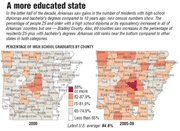LITTLE ROCK — More Arkansans’ names graced high school diplomas and bachelor’s degrees in the latter half of the decade than 10 years ago, new census numbers released Tuesday show.
But the state still lags behind other states in terms of the percentage of residents over 25 with bachelor’s degrees and high school diplomas, the numbers show.
Top state education officials and economists welcomed the gains but said the numbers reinforced what other indicators had been forecasting: More work remains to be done to improve the education level of the state’s residents.
“Yes, we made strides. That’s wonderful,” economist Kathy Deck said. “But everybody knows that we have along way to go.”
The state ranked second to last with only 18.9 percent of residents over 25 holding bachelor’s degrees. That number was well behind the 27.5 percent nationally. Only West Virginia had fewer with 17.1 percent.
The state did better in terms of high school diplomas: 81.3 percent of residents hold them, only three percentage points shy of the nation’s 84.6 percent. Still, the state ranked near the bottom at 45th.
The new census estimates span the latter half of the decade and provide the first snapshot of small towns and rural counties since the 2000 census.
The figures do show some encouraging signs, Deck said.
The proportion of people 25 and older with a high school diploma or its equivalency, such as a GED, increased in all of Arkansas’ counties but one - Bradley County.
Also, 60 counties saw increases in the percentage of residents over 25 with bachelor’s degrees.
The increases are evidence that the state’s educational programs in the past two decades are heading in the right direction, but the data can’t point to any specific initiatives, said Deck, director of the Center for Business and Economic Research at the University of Arkansas’ Walton College of Business.
“It would take a long time to enumerate the number of programs, but ... this didn’t just happen. This is the result of serious effort put into increasing both of these rates,” she said.
Education Commissioner Tom Kimbrell said he also couldn’t point to any one program but highlighted the state’s public-school Smart Core curriculum as one intended to fuel continued increases.
The curriculum includes four years of higher-level math and three years of higher-level science courses aimed at trying to better prepare students for college.
“I think what we’re beginning to see not only in Arkansas but across the nation is the acceptance that a high school diploma is without a doubt the most minimum education attainment that you’ve got to have,” Kimbrell said.
“You’re going to have to have some kind of college degree,” he added.
While Arkansas is making gains in the number of high school students going to college, according to a study from the Southern Regional Education Board, it’s not doing well at making sure those students graduate.
The study found only 37 percent of first-time, full-time college freshmen enrolled at the state’s four-year colleges in 2002 had graduated within six years, the lowest graduation rate of the 16 states tracked by the nonprofit board.
Nationwide, 55 percent of first-time, full-time college freshmen graduated in the same time period.
Jim Purcell, director of the state’s Department of Higher Education, said he wasn’t surprised by the latest poor rankings in the census data, particularly in light of the study and other census figures released during the past decade.
“To me, what all this data is pointing to is the fact that how we do higher education in the state has got to change,” he said.
He said his department is awaiting the findings of a review - scheduled to be presented in a legislative hearing later this week - that will include recommendations on how to improve.
That’s particularly important because new numbers from his department show that “if we educate an Arkansan with a bachelor’s or higher, they have a tendency to stay,” Purcell said.
About two thirds of them stayed in the state after five years, he added.
“I think it’s all a slow dance with industry to make sure at the same time that we’re educating our work force that we’re bringing in the jobs that give them an opportunity to stay,” he said.
Matt DeCample, spokesman for Gov. Mike Beebe, agreed.
“The people that have the knowledge and have the degrees are going to go to where ever they can apply it the best,” he said.
That includes making sure that students who receive aid through the Arkansas Academic Challenge Scholarship program stay in the state, he said.
He also pointed to the scholarship program, funded by the Arkansas Scholarship Lottery, for its ability to attract students to college and eliminate financial barriers that may make it difficult for them to stay in school.
DeCample also said that better preparing students so that they don’t need remedial courses in college is another way to help students graduate without huge debt.
“[Remediation] requires you to go to school longer and the longer you go to college the more money it costs, which takes us right back to the other issue,” he said.
Deck, a University of Arkansas economist, said giving students firm financial and educational foundations is key to pulling ahead of other states.
“From an educational attainment perspective, the benefits are really just almost mind-blowingly large in terms of everything from state revenue, what we can afford in the future, the kinds of jobs we can attract and the ability to maintain a high quality of living for our residents,” Deck said. “All that comes from catching up.”
Front Section, Pages 4 on 12/15/2010

